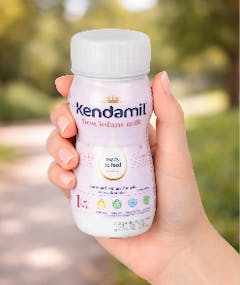- All HiPP Formulas
- >
- HiPP Ready to Feed Formulas
- >
- Cow Milk Formulas
- > HiPP Bio Stage 1 Ready To Feed
Highly recommend! European formula is so much better than the United States! I started using this formula when my baby was one month old. My baby digests this formula very well. I combo feed (breastfeed) as well, but since I have a career now, this HiPP formula gives me peace of mind, knowing that he has not only breastmilk at daycare but also high-quality HiPP formula.
5.0 based on 1 reviews
HiPP Bio Stage 1 Ready To Feed
From in 12-pack
Size:
- 3 Pack (18 Bottles)
- 6 Pack (36 Bottles)
- 9 Pack (54 Bottles)
- 12 Pack (72 Bottles)
EXPIRATION:
- BEST BEFORE APRIL-26
+ NEW U.S. import duties according to this table.
- Organic & Pure – Free from harmful chemicals, GMOs, and artificial additives.
- Gentle on Digestion – easy for sensitive tummies to digest.
- Brain & Eye Development – Supports cognitive function and vision.
Highly recommend! European formula is so much better than the United States! I started using this formula when my baby was one month old. My baby digests this formula very well. I combo feed (breastfeed) as well, but since I have a career now, this HiPP formula gives me peace of mind, knowing that he has not only breastmilk at daycare but also high-quality HiPP formula.

For ages 0-6 months

Yields of ready-made formula

Unit size:

Express shipping from E.U. 🇪🇺
Make your own Bundle & Save!

Make your own Bundle & Save!
HiPP Bio Stage 1 Ready To Feed
HiPP Stage 1 Ready To Feed Infant Formula (0-6 months)
All Organic! Pre-mixed! Zero Prep! No need to boil water! Great for on-the-go feeding!
HiPP's ready made formula is ideal for first time parents new to formula feeding (especially in the first 2 months) where it's advisable to use ready made formula formula as opposed to powdered Stage 1.
This organic ready to feed formula is designed for infants to serve as their primary nutritional source or in addition to breastfeeding. It also incorporates essential probiotics and prebiotics that support your baby's digestive system development. In contrast to Stage PRE Lactose (milk sugar) and starch are the carbohydrates in this formula, making the formula more filling for babies. This formula can be offered to your baby as frequently and in any amount they desire during their initial months.
For those seeking alternatives, we recommend HiPP Dutch Stage 1.
Follow-on formulas include HiPP Bio Stage 2 or HiPP Bio Stage 2 (No Starch) .
The Secret Ingredient
The amount of formula needed per month depends on your baby's eating habits, and whether or not formula is their primary source of food. Below you'll find a sample table for ages 0 - 12+ months based on a 7 oz package of HiPP Bio Stage 1 Ready To Feed formula.
| Age | Water | Scoops | Formula Volume | Meals Per Day | Packs Needed |
| 0-3 Months | 90 ml (3 oz) | 3 | 100 ml (3.2 oz) | 5-7 | 5 / month |
| 3-6 Months | 120 ml (4 oz) | 4 | 135 ml (4.6oz) | 5-7 | 6 / month |
| 6-10 Months | 180 ml (6 oz) | 6 | 200 ml (6.7 oz) | 5-6 | 8 / month |
| 10-12 Months | 210 ml (7oz) | 7 | 235 ml (8 oz) | 3-4 | 5 / month |
| 12+ Months | 210 ml (8oz) | 7 | 235 ml (8oz) | 2-3 | 4 / month |
Organic Skim Milk, Organic Whey Products, Organic Vegetable Oils (Organic Palm Oil, Rapeseed Oil, Sunflower Oil), Lactose*, Galactooligosaccharides From Lactose, Fish Oil, Calcium Chloride, Potassium Citrate, M. Alpina Oil, Choline, Sodium Citrate, L-Phenylalanine, Calcium Orthophosphates, L-Tryptophan, Magnesium Sulfate, Calcium Carbonate, L-Histidine, Zinc Sulfate, Ferrous Sulfate, Stabilizer Lactic Acid, Vitamin C, Natural Lactic Acid Culture (Lactobacillus fermentum Hereditum®), Vitamin E, Niacin, Pantothenic Acid, Copper Sulfate, Vitamin A, Vitamin B1, Potassium Iodate, Vitamin B6, Metafolin (Calcium L-Methylfolate), Sodium Selenate, Vitamin K, Manganese Sulfate, Vitamin D, Biotin, Vitamin B12.
PREPARATION
1. IMPORTANT: Only use the scoop provided in the box.
2. Clean and Sterilize everything (bottle, nipple and ring)
3. Use freshly boiled water only
4. Cool water to optimal mixing temperature at or below 122°F / 50°C
5. Add desired amount of water to bottle using the volumes in the feeding table below.
6. Add one unpacked scoop of formula for every of water.
7. Shake well until dissolved and no lumps remain
8. Cool to drinking temperature at or below 98.6°F / 37°C
Happy feeding!
Care Instructions
1. Expiration date is indicated on each box in the European format DD/MM/YY
2. Store formula powder in a cool, dry place. Do not refrigerate
3. Keep airtight and use within 3 weeks
4. Only use the scoop provided. Do not mix with anything else (such as other milk)
5. Use the bottle of prepared formula within 1 hour
6. If refrigerated, a prepared bottle of formula should be used within 2-12 hours
Fast Shipping From the E.U.
All orders are processed within 2 business days (European time).
All shipments are handled by FedEx or Ups Express, and typically averages between 2-5 business days. Please note that the customs clearance process may add additional processing time and this is not under our control.
While we do everything we can to ensure safe delivery, small dents to cans can sometimes occur in transit. Please know that in the vast majority of cases, the contents remain perfectly safe and unaffected.
Where the option to pre-pay taxes and duties is available, customers who decline this option will be responsible for any and all additional charges levied by the carrier.
For further information please consult our shipping FAQ found here.


Why do babies love HiPP Bio Stage 1 Ready To Feed


Why do babies love HiPP Bio Stage 1 Ready To Feed
The Advantages of Choosing
HiPP Bio Stage 1 Ready To Feed
Providing Optimal Nutrition for Your Infant's Development
5.0 based on 1 reviews
your own bundles!
We know its tough to buy formula when going into a transition stage. Build your own transition kits and STILL save!
happy baby guarantee
If your baby doesn't vibe well with the formula, we'll give you a store credit to try a different one.
No corn syrup
Corn syrup and other types of sugar can be damaging to babies’ gut health, teeth and blood sugar balance.
toughest E.U. standards
Our formulas meet the toughest organic farming standards. No corn syrups, GMOs or pesticides.
100% certified organic
Pasture raised cows. Raised on farms free of pesticides, herbicides, synthetic fertilizers, hormones and antibiotics.
No soy
Many babies are allergic or intolerant to soy (especially if they’re pre-term). This formula is 100% soy-free.
Happy Customer Reviews
Frequently Asked Questions
Find the answers to our most asked questions right here.
When to switch from HiPP pre to stage 1?
Switching from HiPP PRE to Stage 1 formula can typically occur when your baby is around 2 weeks old or as their digestive system matures. Both formulas are suitable from birth, but HiPP PRE is often recommended for newborns due to its closer resemblance to breast milk, being lighter and easier to digest. HiPP Stage 1, on the other hand, includes organic starch and is designed to be more satiating, making it appropriate for babies who may need a more filling option as they grow. Always consult with a pediatrician before making any changes to ensure it aligns with your baby's specific needs.
Why is Ready-to-Feed formula only good for 48 hours?
Ready-to-feed formula is recommended for use within 48 hours of opening due to the potential for bacterial growth. Although these formulas are pasteurized during manufacturing, once opened, they can be exposed to bacteria from the environment or from the baby's mouth during feeding. Refrigeration slows bacterial growth but does not completely stop it, hence the 48-hour guideline to ensure safety and minimize the risk of contamination. After this period, any unused formula should be discarded to prevent possible illness from harmful bacteria that could proliferate in the formula.
Can you mix ready-to-feed formula and breastmilk?
Mixing ready-to-feed formula and breast milk in the same bottle is generally considered safe, but it is not universally recommended. While some experts support this practice, others advise keeping them separate to avoid wasting breast milk if the baby does not finish the bottle. If you choose to mix them, ensure that the formula is prepared correctly first, and then add breast milk. It's important to note that once the baby has started drinking from the bottle, any unused mixture should be discarded within one hour due to bacterial growth risks. Always consult with a healthcare provider for personalized advice regarding your baby's feeding needs.
Does ready-to-feed formula cause constipation?
Ready-to-feed formula can contribute to constipation in some infants, similar to powdered formulas. Formula-fed babies are generally more prone to constipation than breastfed ones because formula is thicker and contains larger proteins that can be harder to digest. Signs of constipation may include infrequent bowel movements, hard stools, and discomfort during bowel movements. It's important to follow preparation guidelines carefully, as improper mixing of formula can exacerbate constipation. If constipation persists, consulting a pediatrician for guidance is advisable.
Is ready to feed formula easier to digest than powder?
Ready-to-feed formula may be easier to digest for some infants compared to powdered formula. Studies suggest that infants fed ready-to-feed formula often exhibit growth patterns similar to breastfed infants and have a lower likelihood of becoming overweight, potentially due to the reduced risk of errors in preparation that can occur with powdered formulas. Additionally, ready-to-feed formulas are sterile and consistent in composition, which can contribute to improved digestive tolerance and less gastrointestinal discomfort for some babies. However, individual responses can vary, and some infants, particularly preterm ones, may experience feeding intolerance with ready-to-feed options.




































